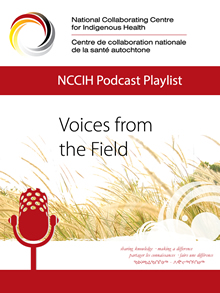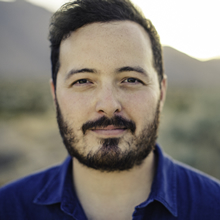 NCCIH Voices from the Field Podcasts
NCCIH Voices from the Field Podcasts
Voices from the Field
Welcome to Voices from the Field, a podcast series produced by the National Collaborating Centre for Indigenous Health (NCCIH), which focuses on innovative research and community-based initiatives promoting the health and well-being of First Nation, Inuit and Métis peoples in Canada.
Episode 16: Supporting grief, mourning and mental health during COVID-19
In this episode, Dr. Jeffrey Ansloos discusses everyday foundations of Indigenous peoples’ mental health, well-being and healing, both broadly as well as specific to the current pandemic.
With public health restrictions in place on travel and large social gatherings, collective grieving and mourning to celebrate the life of loved ones has been severely limited.
Here, Dr. Ansloos discusses its long-term effects and the need for proactive adaptations to support the emotional and mental health needs of families and communities. He ends by reinforcing the strengths of communities and how they support greater mental health and well-being.
Listen on SoundCloud
Bio

Jeffrey Ansloos, Ph.D., C.Psych., is a member of Fisher River Cree Nation (Ochekwi-Sipi; Treaty 5). He is a Clinical Psychologist, Assistant Professor of Indigenous Mental Health and Social Policy, and Chair of the Indigenous Education Network at the University of Toronto. He is a current Canada Research Chair in Critical Studies in Indigenous Health and Social Action on Suicide, at the Ontario Institute for Studies in Education. His scholarship focuses on psychological, sociopolitical, economic, cultural, environmental, and technological dimensions of suicide, particularly as occurring among Indigenous communities in Canada, as well as, identifying every day and clinical practices which enhance wellbeing and prevent suicide, especially through cultural, land-based, and community-centered approaches. Follow him on Twitter @JeffreyAnsloos.
Transcript
Rick Harp: Dr. Ansloos, given the continued restrictions on gatherings and travel, do you have ideas on how to best support grief and mourning for Indigenous families and communities?
Jeffrey Ansloos: There’s a lot of different things one could say about that but every community is different and every community’s needs are going to be different. But most importantly, I always think about the basics first, ensuring people have access to essential things like water, nutrition, sleep and a bit of exercise. Those are some of the basics things, foundations for good health, but also thinking about having access to people in the community that they can rely on for support, and for a lot of young people that’s the specific thing they keep asking for in communities, ensuring that there’s somebody supportive – a youth worker, a health worker – someone who they can rely on for emotional and social support in a context where there may be not a lot of support available to them. Really connecting to other people and added challenges to that, of course, is in social distancing it’s harder for people to do that. So ensuring people have access to those types of supports through digital or telephone means is really important.
Rick Harp: Doctor, can you talk about some of the long term impacts that Indigenous peoples may experience as a result of being deprived of cultural ways of mourning due to COVID-19?
Jeffrey Ansloos: Anytime we look at a context where access to people’s social support and cultural connections are interfered with, there are always going to be impacts of that, both on mental health and on community well-being. As we look at the long-term impacts of COVID-19, the most significant areas where that will impact communities is in relationship to the ability to gather together to celebrate and mourn the loss of loved ones in communities. That’s obviously severed because of the number of social distancing measures. The ways in which we can practice our ceremonies are not necessarily just isolated to gathering in community but community is a big part of that, so there are important moments of grieving collectively that are impacted by that disruption. In the long term, it means that we need to be thinking proactively about ways of supporting people in grieving processes into the future. Communities where there are social distancing measures in place, processes for many communities, when it comes to grieving or mourning a loss of a loved one, communities are governed by time periods. There might be appropriate periods for mourning or there might be ceremonial periods. We might have to think about changing our understanding of protocols to accommodate for the distancing that people are experiencing and not being able to gather and do ceremony together. Those processes have to be recontextualized for the moment.
Rick Harp: Are there any other areas that we should focus on in terms of all of these issues – the bigger picture?
Jeffrey Ansloos: What this period of social distancing in reaction to COVID-19 has made abundantly clear is that the structural issues that are impacting Indigenous communities are made all the more difficult. Inequities, in terms of services and infrastructure that have a real direct impact on health, and in particular mental health, are felt even more so in moments when people are distancing. We talk a lot about the importance of people accessing telehealth or services online but a lot of those interventions assume a lot of degrees of access to internet or access to technology that not just every Indigenous community has across Canada. In terms of what it signals, it signals that we need to be thinking about longer term commitments to ensure that Indigenous communities across Canada have more equitable access to services and opportunities to live healthy lives. The other thing it’s making really clear is that we do need a much more comprehensive commitment to mental health promotion across Canada with Indigenous peoples and thinking about ways to ensure that people have access to culturally relevant and contextually informed services, in terms of mental health.
When we talk about well-being and mental health supports in Indigenous communities, we’re not just talking about one single type of service. It’s not just having a psychologist or it’s not just having a mental health worker or psychiatric nurse. It’s about thinking in more comprehensive ways, so ensuring that the everyday practices that promote mental health, from young people’s experiences with the school system all the way through to Elders in the community and their supports they receive on a day to day basis, that everyday actions that promote mental health are something that are considered. It means ensuring that the conditions that are conducive to mental health are prioritized by, not only local governments’, but federal governments’ investments in Indigenous communities to ensure access to clean drinking water, safe and affordable housing, and environmental health issues like dust control or resource toxicity. Those types of things that are at the level of infrastructure. More broadly, we need to be thinking about investing in forms of education that support different types of professionals that work in Indigenous communities that are informed by culturally relevant approaches to Indigenous mental health promotion but also that value the traditional knowledges of healing that exist within our cultures and our languages and our traditions. Rather than just being one thing, it’s really a variety of things that all together need to be considered to promote a more positive approach to promoting Indigenous well-being and mental health.
Rick Harp: Any final thoughts, Doctor?
Jeffrey Ansloos: One of the real assumptions at the beginning of this pandemic was that there would be a profound crisis of contagions of suicide in Indigenous communities related to the social isolation. Thus far, two things have become clear. One is that we really have no federal mechanism to monitor what’s occurring in terms of suicide in Indigenous communities, and that’s a real issue that I think needs to be addressed in the wake of COVID-19. We need to have a more comprehensive approach, and community governed approach, to ensuring that we have accurate information about what’s happening at the level of communities in terms of supporting mental health and addressing issues like suicide.
The second thing is that people assumed there would be…this national wide contagion effect of suicide in relation to Indigenous communities and thus far, that has actually not been the case. That was an assumption that people had. I think what it really makes clear is living in the community and having connection to one another in community is something that’s really important to promoting mental health and well-being. While these isolation measures have impacted the public at large, have had impacts on mental health, what we are seeing in Indigenous communities is people drawing together, people supporting one another. I think that’s a real strength and something we need to really learn from as we look forward to ways of ensuring we can continue to promote mental health and address suicide prevention in our communities.
Rick Harp: Dr. Ansloos, thank you.
Jeffrey Ansloos: Thank you very much for having me.
Rick Harp: To hear more podcasts in this series, head to the Voices from the Field on the National Collaborating Centre for Indigenous Health, nccih.ca. Music on this podcast is by Blue Dot Sessions. It appears under a creative commons license. Learn more at www.sessions.blue
Download the transcript